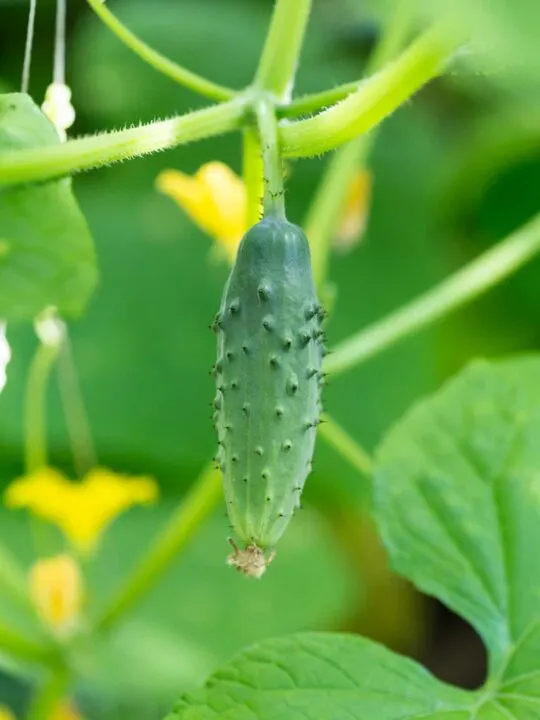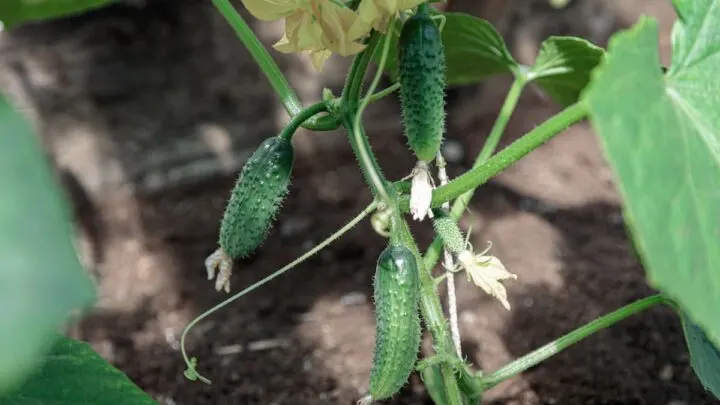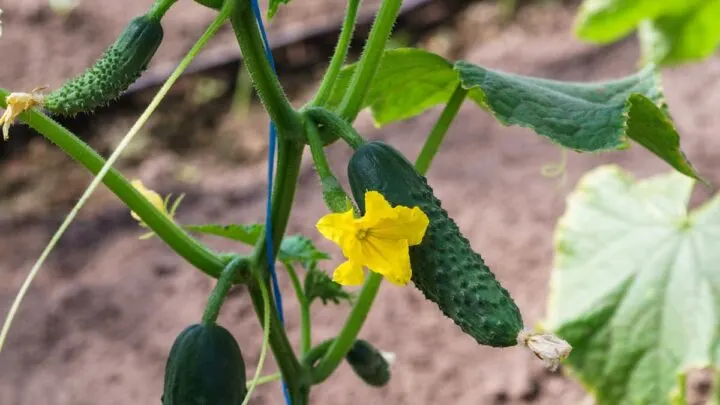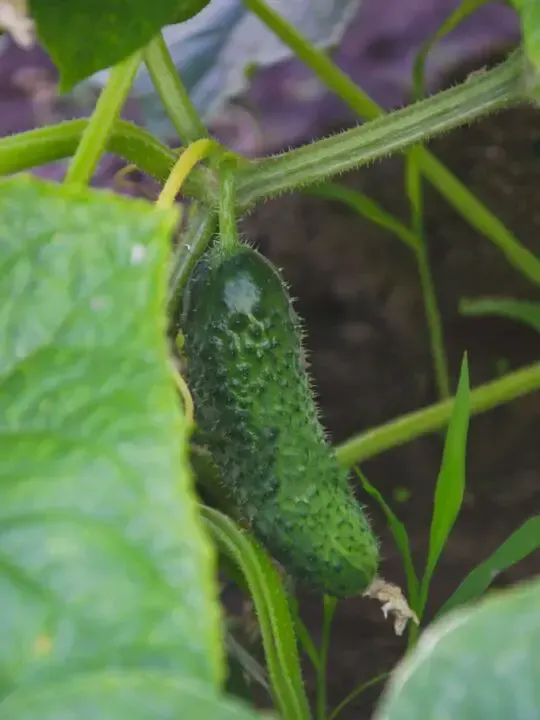Mini cucumbers are enjoyable to grow and use in the kitchen for their crispy sweet flavor, which often exceeds that of larger cucumber varieties. We’ll explore several ways to prepare and preserve mini cucumbers in this article. For cucumber recipes to be successful, they require the cucumbers to be used as fresh as possible, or recipes may end up tasting stale or bitter. As you keep cucumbers over time, you may have noticed changes in their appearance or texture. So what some cucumber enthusiasts may be wondering is, why are my mini cucumbers slimy?
If your cucumbers have become slimy, regardless of the variety, it is a sign they have begun to rot. If you notice a film or slime on your cucumbers best practice is to compost or throw them away.
Knowing that cucumbers are high-producing plants, it is ideal to use and preserve cucumbers actively, early on, to prevent them from piling up in your fridge and getting to the point of spoiling. Read on to learn about processes for preparing and preserving your cucumber harvest.

Can You Wash Off Slimy Cucumbers
When a cucumber gets slimy, you cannot wash it off. Because it’s already in the rotting stage, that slime isn’t going anywhere. And, really, it has zero impact on your ability you see it for eating.
Sure, you can scrub the slime off, but because the rotting process has already begun, it’s just best to toss it away before you end up sick from eating it.
If you really don’t want to toss your cucumber (and trust me, anything you grow in the garden is hard work that we don’t want to waste), then you can definitely use it in another way; composting!
The cucumber still provides a good bit of nutrients in that sense and it could be used to enhance your planting of other crops. In the compost pile, it’ll have a chance to break down and actually be useful to you.

How To Stop Mini Cucumbers From Getting Slimy
Words like preserving and pickling may sound intimidating if you are new to food preservation. Some methods of cucumber preservation are fairly simple, including some types of pickling. Mini cucumbers are great for preserving because they often hold more flavor than larger cucumber varieties.
Proper Storage
Before we get into preserving cucumbers for a longer period of time, let’s go over the best way to store cucumbers and preserve their freshness in the short term. When storing cucumbers in the fridge, they will last the longest if you wash them first and allow them time to dry fully.
Once cucumbers are completely dry, wrap them individually in aluminum foil and place them in a gallon size plastic storage bag left unsealed. This process helps the cucumber to maintain its internal moisture and last in the fridge for 3 – 4 weeks.
Canning & Pickling
The process of home canning to preserve and pickle may feel overwhelming if it is a new practice to you. While you must complete the steps of home canning with precision and care to ensure the food is preserved effectively, it is not an overly challenging process.
Canning will provide the most extended preservation period of your cucumbers, lasting up to a year, sometimes even longer. Cucumbers can be pickled and canned as jellies, salsas, relish, pickles, and more.

If the goal of your cucumber preservation is to make pickles to eat soon, you can make refrigerator pickles with a less intensive process than actual canning. You can find many refrigerator pickle recipes online, ranging from sweet to savory, with varying ingredients.
Refrigerator pickles are easier to make if you work with smaller quantities of cucumbers. You can use mini cucumbers to make tasty whole pickles through this process. Typically, refrigerator pickles will last around 4 – 6 weeks.
Freezing
While it is a less common preservation practice than pickling, freezing cucumbers is a working preservation method.
If freezing cucumbers, the vegetables must first be completely washed and dried. Slice the cucumbers and line them on parchment paper in the freezer for a few hours. Once they are frozen, place the cucumber slices in a freezer bag and get rid of the paper.
It is also possible to freeze cucumbers in ice cube trays. Grate the cucumbers using a box grater or food processor, fill each ice cube section and cover with water before freezing. Freezing cucumbers may not be the most common or ideal system of cucumber preservation. However, if it is your best option, this technique can extend the life of the cucumber for up to nine months.
Dehydrating
Dehydrating cucumbers is an excellent process of preservation that results in yummy cucumber chips. While a dehydrator is preferred, cucumbers can also be dehydrated using an oven. Several dehydrated cucumber recipes are available online that explore different mixes of herbs and spices.
Whatever recipe you choose, ensure that you slice cucumbers evenly and check them frequently as they dry to avoid burning. Dehydrated cucumbers can last up to a few months in a well-sealed container.

Preparing Cucumbers Fresh
While preserving cucumbers is ideal to avoid waste during those abundant weeks of the summer harvest, preparing cucumbers fresh is also an excellent summer pastime that gardeners love. Summertime gatherings often include elements of fresh cucumber in food and drink recipes, many of which we’ll touch on in this section.
Salads, Sandwiches & Sushi
It may be obvious to some, but there is little better than a fresh sliced cucumber on a salad, in a sandwich, or wrapped up in a savory sushi roll. There are too many salad and sandwich combinations with sliced cucumbers to count.
You can decide if you want to slice thicker chunks, thin slivers, halves, or wholes to add desired texture to these lunchtime favorites. In sushi, cucumber can add a nice crunch to any roll and is a signature ingredient in some popular rolls already.
Soups, Sauces & Dressings
The food processor and cucumbers get along swimmingly to create many types of delicious soups, sauces, and dressings.
Pureeing cucumbers can create a base for a cool summer soup that can be accented with diverse flavoring options depending on what herbs and other veggies you enjoy.
Cucumbers can be chopped or grated in the food processor to be included in salsas and relish, adding crunch and flavor to any dish or dip. Tzatziki is an outstanding cucumber and yogurt-based sauce used as a dip or in wraps and gyros. Many detailed recipes for these can be found online and adapted for your preferences.
Cocktails & Mocktails
Cucumber is a refreshing addition to many favorite summertime drinks. One simple and beloved example of this is a glass of ice or sparkling water flavored with a few fresh cucumber slices. You can also add cucumbers to juices, slushies, and seltzers to create a more celebratory summer mocktail.
For those who enjoy cocktails from time to time, cucumber is a great addition to a vodka gimlet or mixed with gin and mint as a twist on a mojito. Cucumber is light enough in flavor that it can be successfully integrated into some mocktails and cocktails.

Final Thoughts on Cucumbers
As you explore different methods of processing and preserving your cucumber harvest take note of what works and doesn’t work for you. If you have a lot of freezer space and are not interested in canning, maybe freezing pickles is the best preservation option.
Some may prefer cucumbers that are more processed in sauces than sliced fresh in sandwiches and sushi. As you determine your cucumber preferences, you can research the cucumber varieties that are best for your desires and use that information to guide what you grow in the future.

Hi there, my name is Allie and welcome to my blog; GareningWithAllie!
Much of what you see written here is just our personal experiences with gardening. Along with the content I write here, there is also a unique collection of gardening topics covered by some of our close friends. I hope you find everything you read here to be helpful, informative, and something that can make your gardening journey the most lovely experience ever! With that said, Happy Gardening!
